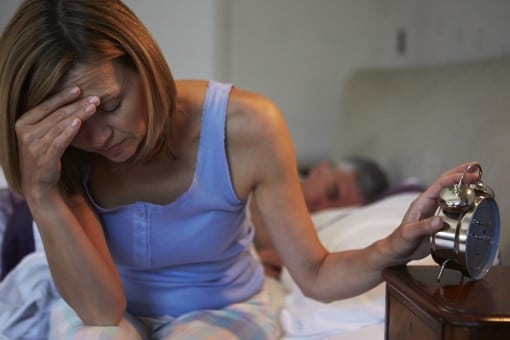
Peace in the valley: remedies for common spouse CPAP complaints
By Jason Wooden, PhD | May 4, 2020
The start of CPAP treatment can be a tough transition for everyone involved. A spouse or partner may have a hard time getting quality sleep because of a noisy CPAP setup or air blowing in their face.
In this article, we discuss what’s really at stake, remedies for some of the more common spouse CPAP complaints, CPAP alternatives worth a try, and other things you can do to make life easier.
Give up CPAP or sleep somewhere else?
Sleeping with a snoring bed mate is bad enough but what can you do when the cure seems to be just as bad for your sleep as the disease?
Likewise, living with untreated sleep apnea is awful and just when you finally get some relief you’re left feeling stuck because of CPAP complaints from a spouse or partner.
Search online and you’re find posts in forums along the lines “CPAP driving my wife crazy” or “spouse is hating CPAP machine”.
In some cases, CPAP users face the agonizing decision to give up their machine or sleep somewhere else.
It can be a tough situation for everyone involved.
And, unfortunately, you really can’t stop your CPAP as the consequences of untreated sleep apnea are bad for you and your relationship.
Worse, people with severe sleep apnea have a high risk of death.
CPAP is one of the most effective sleep apnea treatments but it does have downsides which is why some patients stop using their machines within the first year.
I wouldn’t be surprised if complaints from a bed mate factor into this for some.
Let’s talk about what’s really at stake and your options for dealing with the most common cpap complaints from partners so that everyone can sleep better.
What’s really at stake
A health crisis can add a ton of stress and chip away at the strongest of relationships. Research has shown a link between decline in health and marriage quality.
People who live with untreated sleep apnea become chronically sleep-deprived zombies who struggle with thinking clearly, forgetfulness, mental health, weight gain, and low energy.
They also don’t cope as well.
Altogether, this makes it hard to deal with the everyday challenges of a relationship.
They may also have a hard time participating in everyday activities such as household chores and social outings.
Physical intimacy can suffer due to suppressed sex hormones, erectile dysfunction, and low energy. Emotional intimacy can suffer due to poor communication, irritation, anger, and stress.
Over the long term, poor sleep can cause anxiety and depression which can make a bad situation worse.
And if you’re not careful, things may spin out of control.
That’s what untreated sleep apnea can do to a relationship.
Stopping treatment really isn’t an option.
So, let’s talk about fixes for most common spousal CPAP complaints.
CPAP spouse complaint 1: Noise keeping awake!
The noise from a new CPAP setup is a common complaint from partners. It just takes some getting used to.
Meanwhile, what can you do to keep peace (and sleep) in the valley during the transition period?
Here are some things to try:
Check your set up
Is it correctly assembled so that everything is tight and snug? Is there a leaky hose? If you continue to get mask leaks, try a hose hanger to make sure it doesn’t get pulled or twisted too much during the night.
Change of location
Try moving your CPAP machine farther away or to the groud so the noise isn’t as direct.
Change the surface it’s on
A sturdier night stand on a carpeted floor might help.
Try ear plugs
It’s a low-tech low-cost way to block out annoying sounds. You can some options listed here.
Try white noise
It’s an old trick to mask background sounds. You can try a household fan or a white noise machine.
Sleep separately as needed
It might help to occasionally give each other a night off, especially if a bedmate is going through a bad stretch of sleep
Try a different CPAP setup
These days most CPAP systems are pretty quiet, but it’s worth asking your doctor if you can try a different machine or mask
Interestingly, some bed mates come to find the sound of the cpap machine comforting. In studies, couples initially worried about the loudness of CPAP machine find it to be tolerable.
And most bed mates prefer the sound of the machine over sleep apnea snoring.
CPAP spouse complaint 2: Air blowing in my face!
This is another common CPAP complaint from partners and quite understandable.
Who can sleep through a jet stream of air blowing in their face?
Many CPAP mask setups are designed with holes to help release air from the system. Unfortunately, the stream of air can hit a bedmate right in the face when inadvertently aimed at them.
Luckily, there are a few simple remedies you can try.
Turn around – try turning your body so that your sleeping with mask away from them. If they move around a lot, they may have to be reminded during the night to roll over.
Try a pillow barrier – a big pillow can serve as a great wall to ward off the air attacks
Try a different mask – today they’re a variety of face masks available with the air holes in different locations.
CPAP spouse complaint 3: It’s intrusive!
A spouse or partner may complain about a bulky CPAP setup intruding on the bedroom or bed.
This is less of issue than it used to be since today’s cpap machines are way more compact than what you could get years ago.
However, you still have the machine, the mask, the hose, the cord, and a jug of water. You have to put it somewhere whether it’s a dresser or a nightstand.
And it has to be nearby so that the long hose can reach you.
Your bedroom layout may have to be changed and personal items reshuffled to make space on a nightstand.
You may have to switch which side of the bed you sleep on.
Keep in mind it’s worth it.
And perhaps you can try a nightstand with a lower shelf where the CPAP machine can be more neatly tucked away.
A bed mate may also be annoyed by the air host flopping around at night and disturbing their sleep.
A hose hanger will help keep it securely out of the way and make sure it doesn’t get pulled on as the CPAP user change sleep position.
CPAP alternatives you can try when all else fails
Now that we’ve looked at fixes for some of the more common cpap complaints from partners, let’s talk about what you can do if you’ve tried everything you can think of and everyone’s still miserable.
Have you considered trying a different therapy?
While CPAP is considered the gold standard for treating sleep apnea, it’s not the only treatment.
In the past, your choices have been limited to oral appliances and surgery in some cases. (Oral appliances are devices which are used to reposition the jaw and tongue so that the airway stays more open).
Today, there are more options than ever before with more on the way. Since there’s no machine or blowing air, it might work out better for a bed mate.
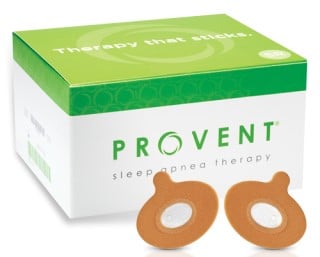
1) Provent sleep apnea therapy
A low tech solution, disposable adhesive valves are placed over the nose to increase air pressure to help keep the airway more open during sleep. Unlike CPAP, Provent uses the patient’s own breathing to create positive air pressure.
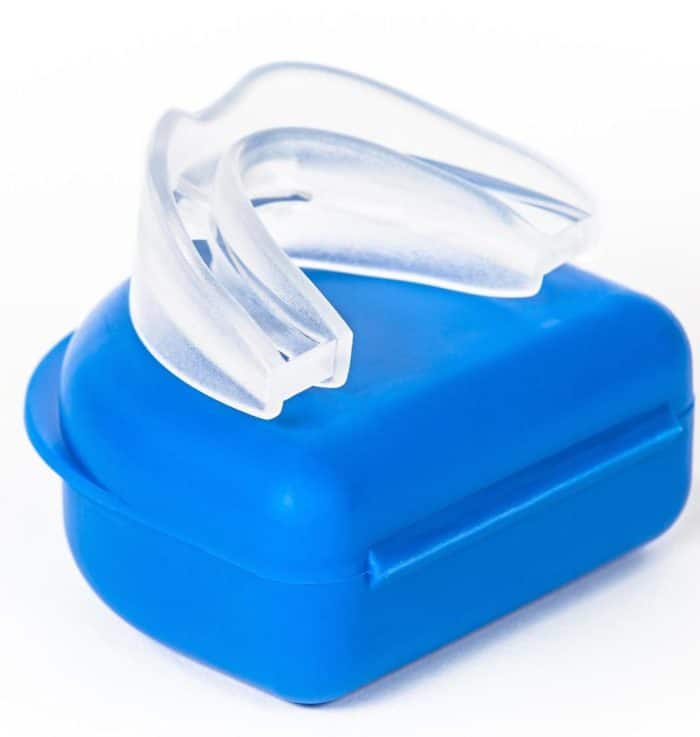
2) Oral appliances
Mouth pieces, also know as oral appliances, can be used to reposition the jaw and tongue so that the airway stays more open.
There’s a wide variety available. Some you get online and form fit at home. Others are somewhat more expensive customized FDA-approved devices that you get through a dental sleep specialist.
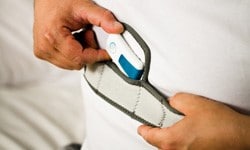
3) Positional therapy:
A low tech solution, disposable adhesive valves are placed over the nose to increase air pressure to help keep the airway more open during sleep. Unlike CPAP, Provent uses the patient’s own breathing to create positive air pressure.
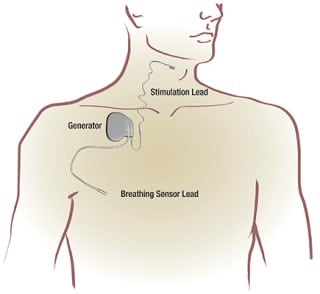
4) Pacemaker-like devices
Among the latest sleep apnea treatment technologies, a small device is surgically implanted to stimulate a nerve that keeps the upper airway open.
Other things you can do to make life easier
Living with sleep apnea is tough enough for a patient and a partner.
It may be a rocky road during the transition period with a new sleep apnea treatment.
However, there’s plenty you can do to give everyone the best chance for sleep each night and to keep things more manageable.
Everyone should be practicing good sleep hygiene, the every day things we do that set the stage for quality sleep at night.
Sleep hygiene tips
- Keep consistent wake up and sleep times
- Avoid naps
- Exercise during the day
- Avoid large meals, alcohol, or stimulants such as caffeine before bedtime
- Maintain a bedtime routine to wind down
- Avoid using TVs, laptops, or other electronics before sleep
- Keep your sleep environment dark, cool, quiet, and relaxing
Bad sleep hygiene can make it harder to fall asleep and stay asleep during the night. It can also undercut the benefits of a sleep apnea treatment.
Other things you should consider include:
- See a doctor to check for other medical issues that may be affecting your sleep
- A spouse or partner should make sure they’re keeping up with their selfcare
- Keep expectations about what you can do each day realistic while you’re working on sleeping better
- Figure out how you can make things work within your current limits
Connect with us:
About Us
Better Sleep Simplified® was founded as a place for you to get clear and well-researched information.
Our goal is to make sure you know about your options so that you take action sooner rather than later.
Check us out on YouTube:
Watch and Learn
Helpful sleep tips, interesting sleep facts and statistics you want to know about
Affiliate Disclosure
This site is a participant in the Amazon Services LLC Associates Program and other affiliate advertising programs designed to provide a means for sites to earn advertising fees by advertising and linking to them.
Important: BetterSleepSimplified.com is for informational purposes only and is not intended or implied to be a substitute for professional medical advice, diagnosis, or treatment. Always consult a physician for sleep and health concerns. See additional information.


